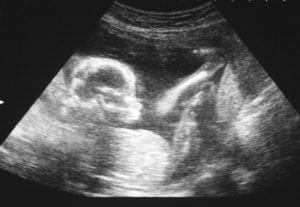By Barb Arland-Fye
The Catholic Messenger
DES MOINES – A bill described by some as the most restrictive abortion legislation in the nation will become law July 1. Iowa Gov. Kim Reynolds signed the bill May 4 — two days after the Iowa Legislature passed it in the middle of the night.
 The so-called fetal heartbeat bill prohibits abortions after an unborn baby’s heartbeat can be detected (about six weeks). The legislation began as an amendment to Senate File 359, which would stop trafficking in the fetal body parts which remain following an elective abortion.
The so-called fetal heartbeat bill prohibits abortions after an unborn baby’s heartbeat can be detected (about six weeks). The legislation began as an amendment to Senate File 359, which would stop trafficking in the fetal body parts which remain following an elective abortion.
In her statement, Gov. Reynolds said: “I believe that all innocent life is precious and sacred, and as governor, I pledged to do everything in my power to protect it. That is what I am doing today. I understand that not everyone will agree with this decision. But if death is determined when a heart stops beating, then doesn’t a beating heart indicate life? For me, it is immoral to stop an innocent beating heart. For me, it is sickening to sell fetal body parts. For me, my faith leads me to protect every Iowan, no matter how small.
“I understand and anticipate that this will likely be challenged in court, and that courts may even put a hold on the law until it reaches the Supreme Court. However, this is bigger than just a law. This is about life. I am not going to back down from who I am or what I believe in.”
“The Catholic Church supports life from conception to natural death. There are numerous views and strategies represented in the broad pro-life movement,” Bishop Thomas Zinkula said. “Hopefully the fetal heartbeat law will be a step in the direction of achieving our ultimate goal of recognizing and protecting in law all unborn human life.”
Bishop Zinkula and the other bishops of Iowa issued a statement May 4 stating, “The Iowa Catholic Conference is pleased the Legislature has taken action in Senate File 359 to stop any trafficking in fetal body parts following an abortion and supports the life-affirming intent of the provision to stop abortions after a heartbeat can be detected.
“As Pope Francis has said, ‘Let us respect and love human life, especially vulnerable life in a mother’s womb.’ We call upon the judiciary to once again recognize that all life should be protected from the moment of conception to natural death.”
Specifically, the fetal heartbeat bill requires:
*A physician shall perform an abdominal ultrasound, necessary to detect a fetal heartbeat according to standard medical practice.
*The physician shall inform the pregnant woman in writing whether a fetal heartbeat was detected, and if so, that an abortion is prohibited.
*The pregnant woman will sign a form acknowledging that she has received the physician’s written statement.
*A physician shall not perform an abortion on a pregnant woman whose unborn child has been determined to have a detectable fetal heartbeat unless the physician determines that a medical emergency exists or when the abortion is medically necessary (up until 20 weeks).
A medical emergency would apply to an abortion performed to preserve the life of the pregnant woman whose life is endangered by a physical disorder, physical illness or physical injury, including a life-endangering physical condition caused by or arising from the pregnancy. It would also apply if continuation of the pregnancy would create a serious risk of substantial and irreversible impairment of a major bodily function of the pregnant woman. It would not apply to abortions sought because of psychological conditions, emotional conditions, familial conditions, or the woman’s age.
Medically necessary exceptions (which were added to the bill):
*The pregnancy was the result of a rape and is reported within 45 days of the incident to a law enforcement agency or to a public or private health agency which may include a family physician.
*The pregnancy is the result of incest and is reported within 140 days of the incident to a law enforcement agency or to a public or private health agency which may include a family physician.
*Any spontaneous abortion, commonly known as a miscarriage, in which not all of the products of conception are expelled.
*The attending physician certifies that the fetus has a fetal abnormality that in the physician’s reasonable medical judgment is incompatible with life.
Opponents of the bill blasted Iowa Republicans – who hold the majority in both houses — for its passage. “Rather than tackling the toughest issues facing our state, the GOP decided to pass a knowingly-unconstitutional bill in the dead of night that will do nothing but put the health care of Iowa women at risk,” Iowa Democratic Party Chair Troy Price said in a news release. “It’s about a fundamental disrespect for our Constitution and women and doctors in our country. With this vote, Republicans have made our state more extreme than Mississippi or Kentucky.”
“The only reason this can be considered unconstitutional is because we have not determined in the courts when life begins,” said State Rep. Shannon Lundgren, R-Peosta. “Once that is determined, the unborn baby receives the same constitutional rights and protections as a born person. We have to put forth legislation that will challenge the courts in order to force that discussion.”
Arguments that the bill “puts the healthcare of women at risk is absurd,” added Lundgren, who served as floor manager for the House bill. “Abortion is not healthcare. Abortion is a procedure …. It dumfounds me when the opposition states that abortions are safe, legal and rare. Who are they safe for? Certainly not the unborn baby. If the argument is because they are legal they are rare, that can be debunked with the fact that over 60-million babies have been aborted since 1973 when Roe-v-Wade made abortion legal.”











